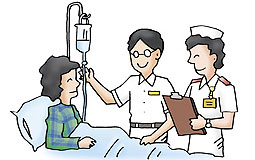
|
| Better care: The Hospital Authority will get an extra $1.24 billion in 2010-11 to strengthen services. |
Recurrent spending on health will reach $37 billion in 2010-11, accounting for 16.1% of recurrent government expenditure, and will be further raised to 17% by 2012, Financial Secretary John Tsang says.
In his 2010-11 Budget speech today, Mr Tsang said the Government will make efficient use of the additional funding to improve medical and health services and take forward healthcare reform.
Besides increasing the Hospital Authority's recurrent subvention over the three financial years starting 2009-10 by $870 million annually, as he pledged last year, Mr Tsang said an extra $1.24 billion will be allocated to the authority in 2010-11.
Hospital services
Excluding the resources for procuring medical equipment and supplies, the authority will make use of the additional funding to strengthen services, including:
* strengthening nurse training - about 1,400 nurses will graduate in 2010, up 40% on 2009. The number will rise to 2,150 in 2012. A total of 2,350 places will be provided in nursing programmes and training in the next two academic years, and 80 places in midwifery training in each of the next four years;
* introducing a case management programme on cancer treatment for 1,100 patients, raising cataract surgeries by 40%, enhancing haemodialysis services for renal patients and introducing a pilot programme on palliative care;
* incorporating eight drugs into the drug formulary to enhance the efficacy in treating cancer and rare genetic diseases, expanding the clinical application of nine drug classes. About 38,200 patients will benefit from these two initiatives a year;
* establishing a joint replacement specialist centre to provide comprehensive post-surgical care and rehabilitation support to patients. The centre can handle 750 additional cases a year, up 40%;
* implementing various infection control measures to enhance preparedness against epidemic diseases such as human swine flu; and,
* improving the authority's medication safety through the newly established Drug Quality Assurance Office.
Drug regulation
To ensure medication safety and safeguard public health, Mr Tsang said an extra $40 million will be allocated in the next financial year to enhance the regulation of drugs. The Government will propose law amendments and explore ways of implementing the improvement measures recommended in the drug products regulatory regime review.
Another $600 million will be allotted in the next three financial years to implement proposals to enhance primary care services, including extending the pilot project for strengthening support for chronic patients, establishing community-health centres or networks, and enhancing primary dental services and oral health promotion programmes, particularly those for the elderly.
Mr Tsang added the Food & Health Bureau will consider public suggestions to revise the value of healthcare vouchers under the Elderly Health Care Voucher Pilot Scheme and to adjust the age limit under the scheme in a mid-term review later this year.
The Government is also working out a supplementary healthcare financing option operating on a voluntary participation basis, containing insurance and savings components. It plans to consult the public on the option this year, and will consider how to make use of the $50 billion earmarked in the fiscal reserves for implementing the healthcare financing reform, taking into account a suggestion on tax deduction for private medical insurance premium or expenses.
|